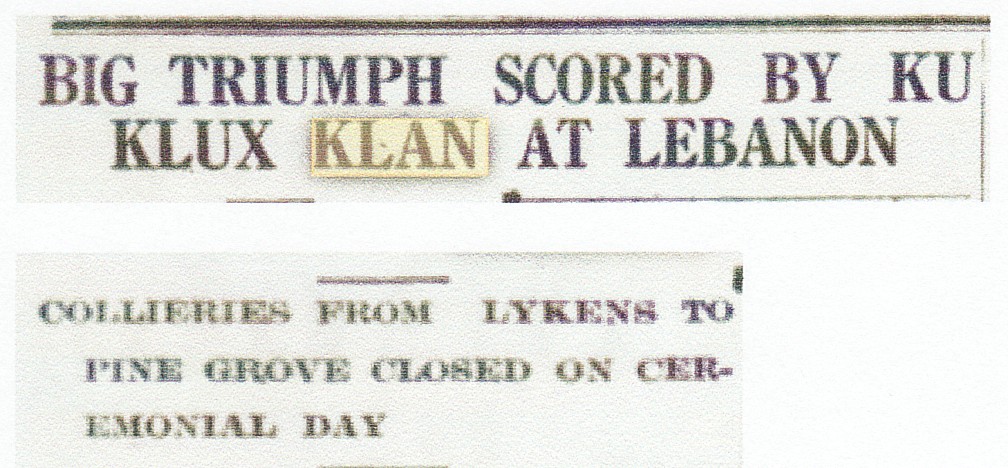Lykens Collieries Closed to Allow Attendance at Ku Klux Klan Rally, 1924
Posted By Norman Gasbarro on January 4, 2018
In 1924, a huge ceremonial Ku Klux Klan rally was held at Lebanon, Lebanon County, Pennsylvania, which was attended in great numbers by Klan members and want-to-be Klan members from the Lykens Valley. Attendance was undoubtedly enhanced by the closing of the collieries from Lykens to Pine Grove and by the special excursion train that originated at Lykens.
This post is a continuation of the reporting on hate groups that were active in the Lykens Valley area in the years following the Civil War. It was a widely known fact that the third iteration of the Ku Klux Klan had a significant presence in the Lykens Valley and adjacent valleys during the early years of the 20th Century. This third iteration of the Klan was strongly white supremacist and was opposed to equal rights for African Americans, Catholics, Jews, and immigrants.
From the Lykens Standard, 26 September 1924
BIG TRIUMPH SCORED BY KU KLUX KLAN AT LEBANON
COLLIERIES FROM LYKENS TO PINE GROVE CLOSED ON CEREMONIAL DAY
The Ku Klux Klan, a growing organization of this section, scored a great triumph at Lebanon last Saturday and staged a parade which proved to be one of the largest fraternal celebrations ever staged in this city.
Organizations from Harrisburg, Reading, Lancaster, Pottstown, Pottsville, Altoona, Newport, York, Tower City, Lykens, and Tremont were in attendance.
The celebration was held in the two twenty-five acre fields of Miles Kreider one-quarter mile west of the Lebanon Fair Grounds, on the Campbelltown Road.
A special excursion train was run from Lykens, meeting delegations at all points into Lebanon, and a total of 1058 passengers boarded the train between this place and Good Springs. Lykens sent a delegation of 257; Williamstown, 132; Tower City, 338; Tremont, 97; and Pine Grove, 71. Good Springs and Keffers are not given in this tabulation as the exact number could not be learned from these places, but a grand total of 1058 took adventure of the ceremonial day, from the Williams Valley.
All collieries between Lykens and Good Springs were closed for the day.
The parade held between 8 and 9 P.M. was more than 12 city blocks in length. Klanswomen from the different places in attendance with large delegations.
The grounds where the proceedings and naturalization was held was crowded all afternoon and evening, and it was estimated that more than 4000 were in attendance, while the parking space for cars cared for over 2000 autos.
In the afternoon athletic drills and daylight fireworks were in order. The Chemical Band of Lebanon gave a concert. After the parade, a Lebanon couple were married by a Harrisburg preacher. The ceremony was not as elaborate as planned because of the rain.
The display of fireworks in the evening were one of the finest overseen in Lebanon. The rain did not seem to affect their display.
After nine o’clock the initiation of naturalization, as it is called by the Klan, was staged. One hundred and fifty candidates, most from Lebanon, and some from other regions were taken in, The ceremony was very impressive, with the three crosses burning in the background, the women’s chorus singing, and the band playing. The York team did the initiation and had charge of all work on the field.
The farm was the ideal place to hold the ceremony. The fields sloped down to a perfect amphitheatre when the Klan worked and the crowds stood on the slopes.
National speakers were on the program, but because of the rain the speeches were postponed for some other occasion which they are planning.
Everything was quiet and orderly during the parade, and on the grounds and the the crowds were handled with ease on the roads near the Kreider farm.
_____________________________________________
News article from Newspapers.com.
 ;
;



Friends of mine had a grandfather, African American, served in USN during Civil War. He married rather late in life (his late 60s) to a younger woman, and they had several children. He was a barber in Reading after the war, and his son remembers the family was pressured/forced to leave Reading because of racial tensions in the early 20th century. He said the Klan was very active there at the time. Sad to see that this happened 50-some years after the Civil War, and still seems to have a foothold today.